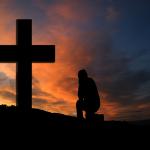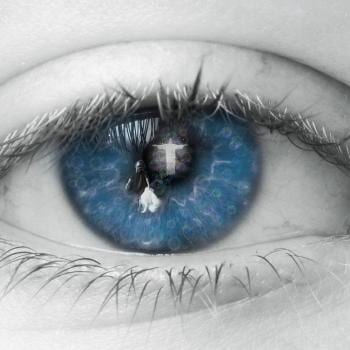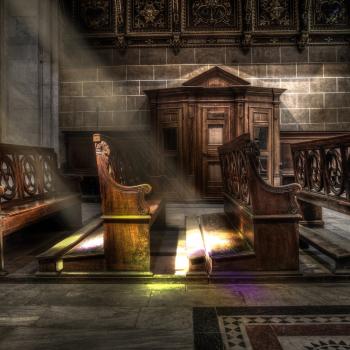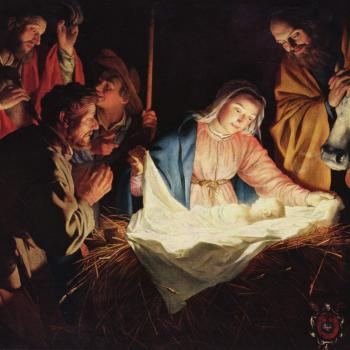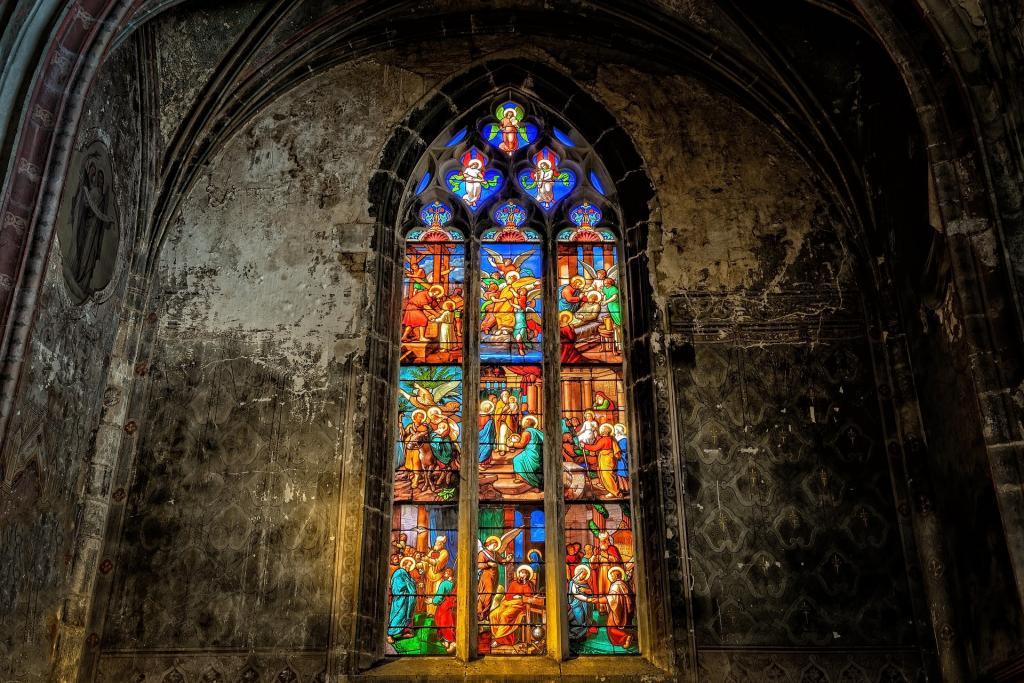
I was ten when my parents discovered Mennonites in northern Indiana. I have clear memories of their conversion process.
My father worked all day, then stayed up late at night to read Anabaptism: Neither Catholic nor Protestant. The memory of walking into the dungeon room at Menno-Hof and hearing a hymn rise up out of a pit in the floor is something I’ll never shake. And I remember how excited my father was when my grandparents came up to visit and we went back to the museum at Menno-Hof to walk them through it.
My parents discussed the things they learned about Mennonites with their family and friends. They were happy to have found a group with such pure beliefs. My parents found a church that preached love and non-violence, which was as close to the gospel as they’d seen anyone get. After a period of studying to make sure it wasn’t actually some sort of cult, they happily joined. My father was even re-baptized. My mother, sister, and I stood at the front of the church as he knelt and the pastor poured water over his head.
Everything about their conversion was joyful. My parents would share that joy with anyone who’d listen for two seconds. It wasn’t surprising, given how cynical my father had been about religion before that. They’d found something wonderful, so obviously they wanted to share it. Within months of converting, my parents were already bringing new families into the church. Over the next twenty years, I couldn’t even count how many people they brought into Anabaptism or some other Christian tradition.
My conversion story isn’t like that.
I converted on the down low. People who haven’t grown up around Mennonites tend to view them as quaint (especially when they confuse them with the Amish) or at least harmless, what with all the pacifism and such. That’s not how people tend to view Catholics. Some of that hostility is justified, while some of it’s based on those anti-Catholic lies I used to hear when I was hanging around Evangelical churches in the south. It’s hard to tease out which is which sometimes.
I didn’t go around to all my family and friends to proudly tell them about this amazing church I’d found, like my parents did. I mostly kept my nose in books, my butt in a chair at RCIA, and my mouth shut. Since I’m not perfect, I did consult a couple of people when I had questions, but that was rare.
When I made the decision to move forward, I told my closest family members and a small group of friends. It was something along the lines of, “This is what I’m going to do, just so you know. Now, let’s talk about something else.”
My parents converted before they’d been exposed to the darker side of Anabaptist churches. (Oh, there’s plenty of abuse there too. I’ve lived it.) They went in with blinders on, as I think most converts to any religious tradition usually do. For better or for worse, I came into the Catholic church with my eyes wide open. That’s an uncomfortable, and frankly painful, way to make the transition.
As Easter got closer, our RCIA instructor asked us to share how we were feeling. As we went around the room, people said they were happy or excited. I said I was terrified.
I had to expand on that a little when nobody knew how to reply.
Without going into my whole backstory (because, believe it or not, I really don’t like rehashing it all the time), I mentioned I’d had a “rough time” in a church before. Joining the church put me in a vulnerable position. It didn’t take a leap of faith to get me to believe in God, but it was a huge leap of faith for me to be sitting in that room.
Was I being adopted into a family or was I exposing my neck to the executioner? Or was it both?
My conversion experience isn’t one of excitement and pure joy. It’s joy mixed with sorrow. How could I possibly enter this church and my new life as a Catholic without, at the same time, grieving the loss of my old church and my old life? Every step forward I took reminded me of an equal step I’d taken leading up to my baptism in a Mennonite church when I was sixteen. That obviously didn’t work out so well for me.
Is it really a mystery why I haven’t shared my whole “conversion story” with anyone?
I can’t talk about my love for the Catholic church without also talking about my fear of it. Of course I’m worried about being hurt. Of course I’m worried about being complicit in the abuses that happen.
A few people who don’t think being sensitive is something they should have to worry about will want to stop me right here and ask, “Then why’d you convert?”
I don’t have airtight apologetic arguments to throw at that (as though they even existed). I’m not going to lob the Catechism or the Bible at that question, as if that proves anything to someone who isn’t already Catholic or Christian. Anyway, the reasons I have can’t be turned around and applied to why anyone else should go the same route I have. My reasons won’t be another person’s reasons.
Why did I convert? I can’t give you a satisfactorily rational answer because there’s nothing rational about it in my case. Believe me, I’ve spent years trying to logic myself out of it. I was never an enthusiastic convert.
I believe in Jesus. I believe this is where he wants me because I believe the Holy Spirit works on people in ways we can’t understand. Again, I have no idea if that’s true for anyone else or not. It’s not my right to say, and let’s be real, if God is God then he doesn’t need me bullying anyone into joining his church. It might be harder for someone to hear the Holy Spirit if they’ve got some imperfect human yakking in their ear the whole time.
So, yeah, have fun picking that reasoning apart. I know a lot of former evangelicals have more academically motivated conversions, and that’s fine because I know a lot of people connect that way, but that’s not the case with me. I don’t need to have all the answers. I’m not a fundamentalist anymore.
I’m always afraid of groups of religious people, and maybe we all should have a certain level of healthy fear there. When I’m out walking and I see a snake, I know it probably won’t bite me and it probably isn’t venomous, but it’s a good idea for me to keep a close eye on it, just in case. We have plenty of snakes in our churches.
I faced my fears (as I will continue to face them) and was confirmed at the Easter vigil. I got to switch places with my father. I watched him be baptized into the Mennonite church, and he watched me be confirmed into the Catholic church. (Don’t worry about my family giving me a hard time for converting. They realized I was going to go my own way a long time ago.)
I announced my conversion on Facebook that Easter, acknowledged it would probably surprise some people, and ended my post with, “If you’re afraid I’m going to hell now, you can pray for me. That’d be nice.”
Before I started attending RCIA classes, I spent years going over all the things that concern me about Catholicism. One of my main concerns was sexual abuse. I’d heard about it in the early 2000s, just like everyone else. Unlike some people, I wasn’t convinced it was a problem that belonged in the past. People don’t just stop abusing their authority, and it didn’t seem to me that the enablers of those abusive priests had been held accountable. Where you have enablers, you have predators.
Would joining the church mean I would become complicit in that sexual and spiritual abuse?
Honestly, I still don’t know. I’m fighting against sexualized violence with whatever I’ve got, but I don’t know if it’s enough.
I have a few online friends who are Catholic, though most of my friends aren’t, and I don’t have a real Catholic community offline yet. I’m living through the normal little side-eye you get when people see your change of views as a threat to their own beliefs, and I’m very aware of the lies people spread about Catholicism (having grown up hearing them) and the absolutely deserved criticism that already exists because of the Boston sexual abuse stories.
Then I saw stories about Cardinal McCarrick come out, and though I was saddened by it, I wasn’t shocked.
Right after that, the Pennsylvania Grand Jury report came out. I was heartbroken for the survivors and angry, but I wasn’t surprised by it. I was surprised by how surprised a lot of Catholics were.
I also wasn’t surprised by the uptick in hostile reactions from non-Catholics. Obviously people were going to be outraged. That’s the correct reaction. We should all be outraged.
How do I talk about my positive experiences as a new convert without allowing that to paint over the horror of all the abuse that has been done by and enabled by so many powerful men in the Catholic church?
How do I celebrate and mourn at the same time? I don’t know.
When people push back at me for converting, I get it. I know what it looks like, and it’s a deep source of sadness for me that even people who’ve known me for years, who know what I’ve been through and have seen me advocate for survivors, have weaponized the sexual abuse of children and adults against me.
But what’s my sadness compared with what the survivors of abuse within the Catholic church have faced?
Sometimes I’d like to go on the defensive and save my pride, but how would that help stop abuse within the church? The more defensive I am, the more shielding those predators and enablers have. I came into the church with my eyes wide open, and I have to keep them open.
The Catholic church doesn’t need me to defend it. More than enough people are doing that, and a lot of them are causing damage while doing it.
That’s one thing I did keep from growing up in Mennonite churches. We turn the other cheek. When someone (or some institution) that is in a position of power turns the other cheek, it sends a powerful Christlike message.
The Catholic church has all the power here, not the survivors. Whether I’m comfortable with it or not, I’m the only representative of the Catholic church some people know. I have to turn the other cheek because I’m not just Kristy in those conversations. I’m Catholicism.
It’s hard.
It’s not a fun time to be a new convert. I’ve still got a lot to learn (as we all do) while I’ve got people trying to debate me (without my consent) into theological corners. Then I have people calling me a hypocrite for joining an institution that is, in some circles, mostly famous for sexual abuse. And it’s hard to watch people leaving the church I just joined, even when I understand why they’re doing it and support them.
Sometimes I think being a newer convert puts me at an advantage. I don’t have a long history of loyalty to the Catholic church getting in my way. I never thought it was anything other than what it is. At the same time, I can’t claim to be here because I’ve always been here. I have to take full responsibility for my presence here.
I don’t fully understand what I’m doing here, but I’m here. I think anyone who’s still here has to actively work against abuse within the church. I don’t know if that erases our complicity or not, but doing anything else would be to do evil by doing nothing. How could I call myself Catholic while doing evil?
God told St. Francis to rebuild the church. That’s the task in front of all of us right now. I don’t know what the Catholic church will look like in fifty years. What I do know is small actions can have a significant effect.
I don’t know how much I can accomplish. I’m nobody, and you might be a nobody too, but millions of nobodies sure is something.


